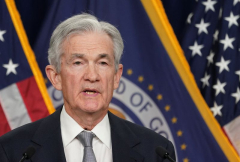Downtime
In a culture of reactive chaos, Amanda’s Mild Takes is one of the only things keeping me sane.

Photo illustration by Slate. Photos by @amandasmildtakes.
Sign up for the Slatest to get the most insightful analysis, criticism, and advice out there, delivered to your inbox daily.
Ever since Donald Trump took office, American supporters of liberal democracy have found themselves tripping into pits of anxious despair. But unlike many of her peers, Amanda of Amanda’s Mild Takes isn’t panicking. “I don’t have a personality that tends towards anxiety,” she said in a recent video about Trump’s tariffs. While plenty of her nearly 400,000 followers on Instagram and TikTok are stockpiling nonperishables or spiraling about the flop era of American democracy, Amanda urges restraint.
In a left-leaning social media culture prone to dwelling on worst-case scenarios, Amanda’s explanatory videos about Trump and Congress are little oases of calm. Her no-nonsense, allergic-to-hysteria vibe has led many of her followers to credit her with maintaining their sanity during this time of extreme political uncertainty. In the months since Trump’s inauguration, the self-described amateur historian has gotten popular enough to earn follows from members of Congress and state legislators across the country. (She keeps her last name private and won’t reveal her nonpolitical day job due to repeated death threats.)
Instead of focusing on Trump’s big, scary plans that might never come to fruition, Amanda promotes schadenfreudean weekly roundups of his court losses, political failures, and personal setbacks. Her lighthearted, punny sarcasm is squarely aimed at millennials: “Get in, babe, we’re going to Snarkansas.” She summarizes her project as “the Pettysburg Address,” and recently used a song from Hamilton to give a reluctant nod to Josh Hawley for his defense of Medicaid.
I spoke to Amanda about the appeal of the mild take, whether panic is ever productive, and the pressure of being responsible for so many Americans’ mental well-being. Our conversation has been edited and condensed for clarity.
Christina Cauterucci: How would you define a mild take?
Amanda: Some people interpret it as politically moderate, which I guess is one way to look at it. But I think of it more as levelheaded. I try to avoid catastrophizing or spinning out into a lot of political anxiety. I try to be very grounded in history and precedent—things that have happened before that Trump is doing now that seem like they’re unprecedented but really aren’t.
How easy is that for you? What is your personal emotional orientation toward this political moment?
Rage, mostly. And that’s just a personality thing. I definitely tend more towards anger in a situation that I feel like I’m not in control of, which is one that we’re in. So I usually have a baseline rage, and have since probably the first time Trump was elected. I guess I’ve just kind of gotten used to it.
This makes me sound like a bro podcaster, but I’ve read a lot of stoics. I’ve done a lot of work about managing anxiety and releasing things that you can’t control. I really think that the only way to manage anxiety in a big moment like this is information and action, so I just focus on those two things. They could be rounding you up in a truck to put you on a wall, like in The Handmaid’s Tale, and panic would still not be the correct thing to indulge in in that moment.
I don’t want to perform panic for people, and that actually irritates people. Sometimes I get accused of gaslighting my audience, because I’m not openly scared enough, they feel like. Some people want me to be more panicked to validate their feelings. But that’s not my job.
What vibe are you trying to cultivate?
Educated resistance through humor is what I’m trying to get at. There are so many studies of authoritarians and dictators in history that show that making fun of them is one of the most effective methods of resistance, because the last thing someone who is an authoritarian wants to be perceived as is silly or weak. And Donald Trump is both of those things. He’s such a clown, and he is ruling by executive order because he’s too weak to get anything done through Congress. It is really important to me that we let off this messaging of panic and “America is doomed” and “the Constitution is dead,” both because it’s not true and because that is obeying in advance.
If you position Trump as what he actually is, which is a desperate, ridiculous figure trying to cling on to power, and you come at it from a position of knowing how the government operates, and knowing historically how we have resisted moments like this before, then I think that that puts us as a party in a much better position to resist what’s happening right now.
How did you get started doing what you’re doing now?
It actually started in 2020, that election. I was on my Instagram account. I did something called the “hope train” leading up to the election, which was just talking about the reasons why I thought that Biden was going to win—walking people through the electoral process. I had a private Instagram account, so it was just me talking to my friends. But that was the first time I had done any kind of educational political content. And then I stopped for the entirety of the Biden administration, because I didn’t feel the need to.
Then, when Elon Musk did his salute at Trump’s second inauguration, that set me off. I was like, Oh, no, this is not gonna work for me. So that’s when I started making political content again, about this administration. And it blew up.
How did that happen?
It was wild. I started doing the whiteboard, which is just a big easel with Post-it notes that I use to track legislation as it moves through Congress, because there is no easy way to track that for a normal citizen. That blew up.
Then I started doing roundups of headlines covering Trump’s court losses, and all the ways that the administration is failing to actually move most of what they’re trying to do to any permanent place. And people had a big appetite for “Wait, you mean that didn’t actually happen?” Or, like, “You mean the court actually stopped him and he listened?” Because he listens more often than he doesn’t. The Daily Show reshared one of those videos on TikTok, and that kind of





